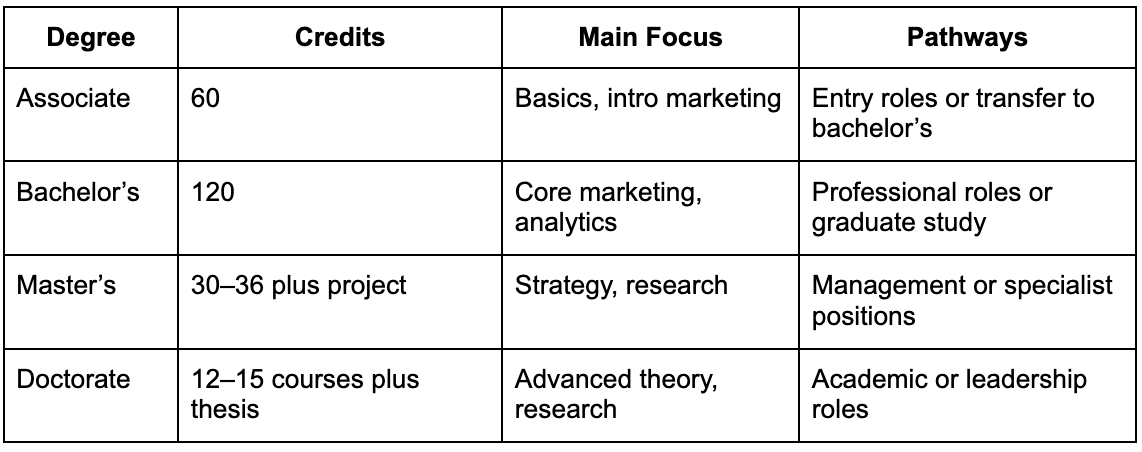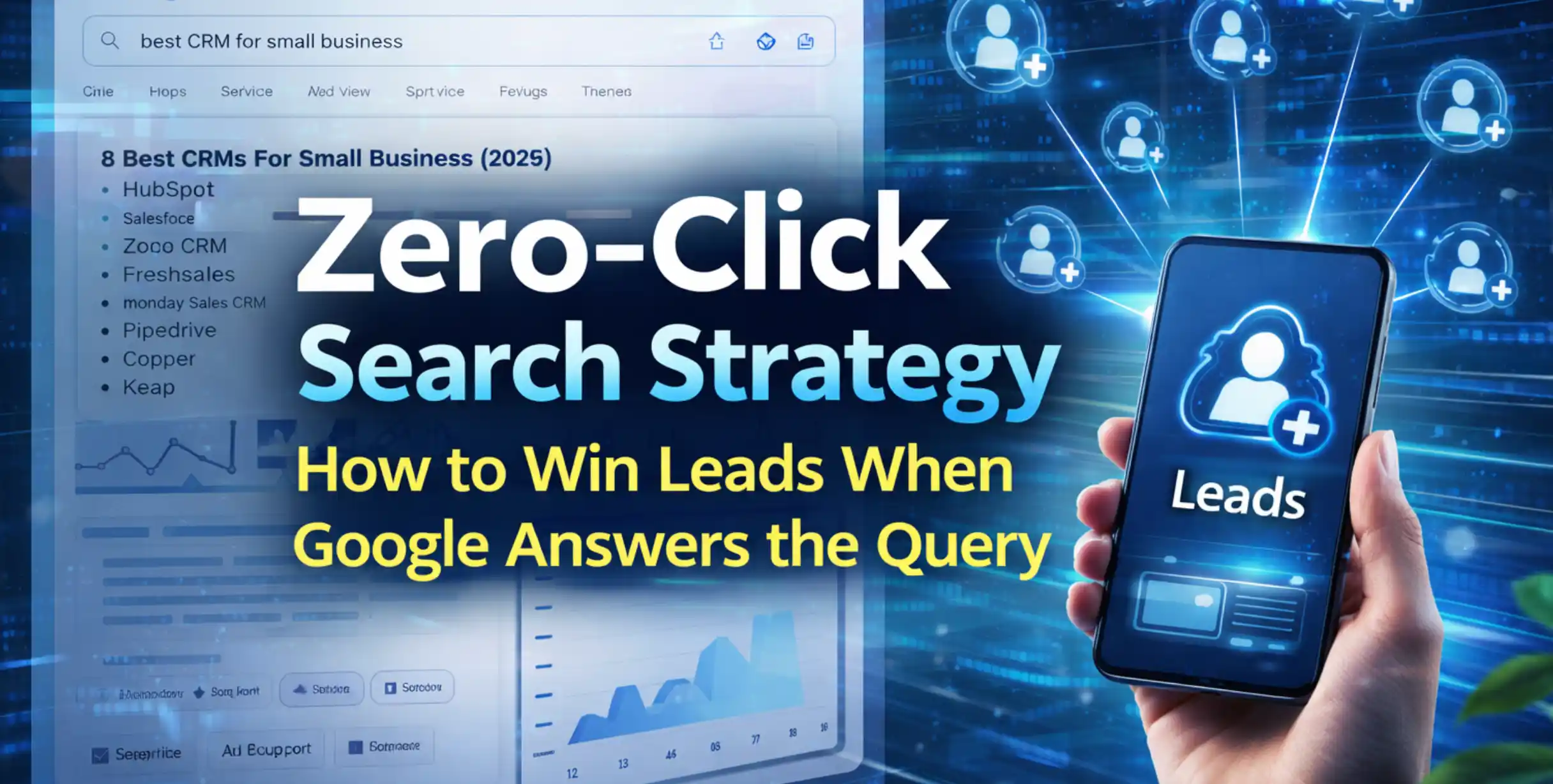Marketing Degree Requirements in 2025: Credits, Courses, Costs, and Career Paths Explained
Updated on
Published on
A marketing degree assists students in mastering all the important tools, strategies, analytics, and communication skills. It leads to business, sales, advertising, and research positions. In order to be successful, you have to fulfill academic and practical demands. In this guide, you will learn about degree levels, core study, and how AI tools can help in your path.

Degree Levels and Their Requirements
Marketing can be studied at different academic levels, depending on how far you want to go in your education. Each level requires different credits and focuses on basic introductions to advanced research, with growing expectations for data use and analysis accuracy.

Associate Degree in Marketing
An associate degree usually demands around 60 credits, with some focused on general education. You take courses in writing, math, sciences, and basic marketing, finance, and consumer behavior. You gain foundational knowledge and can enter entry-level roles or transfer to a bachelor’s program. However, many senior roles require at least a bachelor’s degree.

Bachelor’s Degree: What You Must Do
A bachelor’s degree often requires about 120 credits in total. One-third to one-half of those credits go into your major. You cover general education, then core marketing classes: advertising, consumer research, digital marketing, analytics, branding, and sales management. Some programs require a minimum GPA, sometimes 2.5 or a C level in required mathematics. You may also need internships, projects, or capstone work. After completing these, you can enter roles such as public relations assistant, media planner, or business analyst.
Master’s Degree in Marketing or MBA Option
Master’s programs typically require 30 to 36 credit hours plus a capstone, thesis, or research project. Coursework goes deeper into consumer behavior, pricing, marketing strategy, and data analysis. You may consider specialization paths such as digital marketing or brand management. With a master’s, you can qualify for manager or specialist positions in research, strategy, or marketing leadership.
Doctoral Degree: PhD or DBA Focus
PhD or DBA marketing degrees require between 12 and 15 courses, a comprehensive exam, and a dissertation or research project. Besides demonstrating mastery of research methods, modeling, and theory, you might be teaching at universities or conducting original research. A few people holding a doctorate in marketing may become Chief Marketing Officers or CEOs; nevertheless, many top management positions are also accessible to those with strong business backgrounds.
How AI Tutor Tools Support Marketing Degree Students
In the upper half of your learning experience, you can benefit from Tutoring AI platforms that serve as personalized help tools. The best platforms offer academic guidance, support, and access to learning resources. They can lecture on key topics in marketing theory, assist teachers in designing quizzes, and offer more consistent support than many human tutors.
An advanced AI tutoring system assists students to perfect concepts such as data analytics, customer segmentation, and marketing automation. The system's scalability, effectiveness, and flexibility improve the precision and interaction between the learner and the tutor. As it totally changes the mode of learning, it complements your academic studies and speeds up your outcomes. Those who work in marketing and wish to be employed in analytics must completely understand data, platform integration, and automation.
Main Coursework and Skills
Typically, students start with research and analytics, where they are taught how to gather and understand data using surveys and reports. Consumer behavior and psychology classes center around decision-making, whereas advertising, branding, and promotion dissect the ways in which the campaigns are conceived and implemented. Besides that, digital marketing and social media have become a core part of the curriculum, with several hands-on activities such as content calendar management or search engine optimization. Common areas of study include:
- Marketing research and analytics
- Consumer behavior and psychology
- Advertising, adaptability, branding, and promotion
- Digital marketing and social media
- Business foundations (finance, statistics, operations)
- Communication skills in writing and speaking
Such areas of study give students the knowledge and skills to budget, analyze, and plan. Writing press releases, preparing reports, and presenting proposals, vital in marketing communication, are also part of communication development.

Important Points to Review in a Program
While weighing the different marketing degree programs, it is beneficial to consider a number of significant factors. The certification and the school's image can impact the degree's value in the eyes of employers. The matter of specialization is also important because many universities give the possibility of choosing a more specific area of study, like digital marketing, analytics, or consumer psychology. The main things to consider are:
- Accreditation and reputation of the institution
- Specialization tracks (digital marketing, analytics, consumer psychology)
- Internships or project-based learning with real companies
- Cost per credit and total tuition over the full program
- Support services such as tutoring or career centers
- Use of innovation tools and methods
Internships or co-ops contribute to hands-on experience, whereas career centers and labs offer additional academic and professional support. The programs where AI-driven tools and automation in the curriculum prepare students to adjust to industry transitions and maintain their competitive advantage.
Costs and Time Investment
The cost of a marketing degree varies with the school's choice and the program's level. An associate degree at a community college in the U.S. is usually between $3,000 and $5,000 per year. A bachelor’s degree at a public university can cost from $10,000 to $15,000 annually; however, the tuition fees of private schools can go over $30,000 per year. Master’s degrees, such as an MBA, typically range from $40,000 to $70,000, and PhD programs can be more than $100,000, especially when fees and research costs are involved.
Every level beyond also takes more time. Usually, an associate degree is 2 years, a bachelor’s 4 years, a master’s 1–2 years, and a PhD 3–5 years. For instance, someone going for a bachelor’s degree at a public university might need four years and $40,000–$60,000, whereas a doctoral student may be able to take five years and more than $100,000 before graduation. The efficiency of study planning, such as taking summer courses or choosing accelerated tracks, can sometimes shorten the timeline and reduce overall costs.
Career Paths and Core Marketing Trends
Careers are frequently determined by the degree of marketing. Graduates can become marketing assistants, social media experts, or event coordinators with an associate degree. Examples of positions available to a bachelor's degree holder include PR assistant, junior analyst, or digital strategist. A graduate with a master's degree usually advances to the marketing manager, brand strategist, or research director role. A doctorate typically makes as an academic post, executive, or chief marketing officer. Marketing careers share some competencies at every level:
- Whole channeling between online and offline
- Individualization of customer messages
- Automation and analytics
- Flexibility towards customer patterns
- Teams collaboration
These capabilities affect marketers' decisions during the campaign. For example, the company can automate the routine part of work and thus save time, while personalization allows them to target a specific segment of customers. Flexibility is also essential, as the focus of the campaign can change at any time due to a transformation in consumer behavior or new platforms. Well-structured degree programs expose students to the practical development of these skills through coursework, projects, case studies, or technology-based training.
Final Thoughts
Marketing is still a good degree for most business, research, and leadership positions. But your credentials are only part of the story. If you want to be competitive, you need to know analytics, use digital tools, be creative, and make decisions based on data. Using AI tutoring and other tools to complement the coursework is a great strategy. A tool like Tutoring AI can be your academic partner, offering customized solutions and providing the learning materials you need whenever you want. It is a perfect solution to close gaps, ensure practice is done, and enhance productivity. The most important thing will be your ability to learn quickly, be flexible, and work with others, as the field changes with more and more automation.









